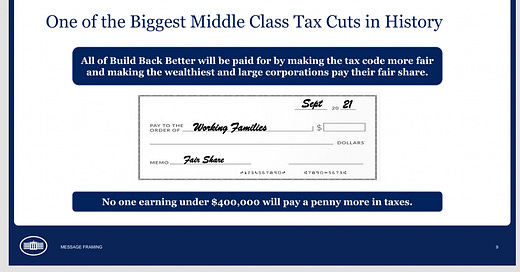Keep the Long-Term Goal of 'Build Back Better' Front and Center
Populism may work in the short term. But the real goal is a stronger economic foundation for America’s workers, families, and businesses.
As President Biden and congressional leaders continue their search for a path forward for Democrats to pass both the physical infrastructure and reconciliation bills, the White House is promoting a “fair share” framework as its lead communications approach for advancing these bills with the public.
In purely political terms, there is practical wisdom to this approach given public opinion. Every poll in the history of polling returns good numbers for “tax the wealthy more” and “cut my taxes”. Voters love getting tax cuts and spending programs paid for by rich people. So naturally, the White House communications team is playing up the populist formula of increased taxation for the wealthy coupled with “one of the biggest middle class tax cuts in history” as part of a fair share narrative for Build Back Better.
It should be noted first that this is potentially confusing to voters on its own, since the tax cuts are not actual reductions in the federal tax rates for middle income people but a series of tax credits for families with children and lower-income earners. If you say you’re cutting middle class taxes, don’t be surprised if some voters think that this means their current 12, 22, or 24 percent tax bracket is going down. (Tax rate hikes are envisioned for high-earned earners in the bill, however.) Expansions of the Child Tax Credit provisions and other tax cut measures on child care or health care are worthy on their own so it’s worth spelling this out to avoid confusion.
More important, this populist tax cut framework potentially favors near term political gains over the longer-term persuasion necessary to advance key national priorities across many years.
The pressing question for strategic communications around these policies remains: What actually convinces voters that these expansive plans are not only good for them now but good for the country as a whole, and worth sticking with despite the costs and complexities of implementing?
To advance these longer-term goals, two additional frameworks are worth considering:
“Economic security for all families.” The Build Back Better plan, whatever its final form in legislation, will contain a critical set of investments to bolster the financial security and wellbeing of working-class and middle-class Americans—the bulk of the American population.
A good through line for this agenda would then stress family security as a key theme and outcome of the legislation. Higher paying jobs, child care support, investment in schools, paid leave, cheaper drugs, health care expansions – these are the building blocks for economically secure families in all parts of the country.
Working-class and middle-class voters have a great deal of uncertainty about the world these days, and their relative position in it. A plan like Build Back Better can therefore offer tangible reassurance that a job loss, wage reduction, or change in work won’t result in utter calamity. Get that across to voters.
“Strong at home, strong in the world.” A companion framework for Build Back Better could also stress the comprehensive linking of domestic and international policy envisioned in the legislation. This is more abstract and harder to communicate, but important nonetheless for America’s future success globally.
A strong at home, strong in the world theme would provide a clear set of arguments linking the above family security measures with clean energy and physical infrastructure investments to bolster the national economy and improve America’s ability to compete with China and other nations.
We are going to make more things in America, and lead the world in advanced technologies and cleaner energy sources. We are going to fix and upgrade our transportation, energy, and communications infrastructure. We are going to make sure more people have the education and skills necessary to succeed, and that everyone has adequate health care and financial stability necessary to thrive.
America has the best workers and businesses in the world — and we aim to keep it that way.
The animating principle of Build Back Better from Biden’s presidential campaign was clear: we need to create a stronger foundation for America’s workers, families, and businesses. Increasing taxation on the wealthy is merely a partial means to financing this objective, not the goal itself.
Biden should have faith that American voters will get behind the longer-term goals of strengthening families, shoring up the economy, cleaning up the environment, and investing in our collective future. This will only succeed if he is willing to make this case directly and offer voters a clear explanation for how his policies will produce a better America going forward.
Populism usually works in the short term. But the easy path is not always the best one for building deeper public support for government action.





